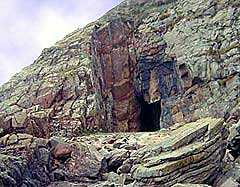Readings:
Numbers 22:21-33
Psalm 97
Acts 10:21-35
Matthew
28:16-20
Preface of Pentecost
[Common of a Missionary]
[Common of a Monastic or Professed Religious]
[Common of a Pastor]
[For the Ministry II]
[For the Mission of the Church]
PRAYER (traditional language)
O God, who by the preaching of thy blessed
servant and bishop Ninian didst cause the light of the Gospel to shine
in the land of Britain: Grant, we beseech thee, thath having his life and
labors in remembrance, we may show forth our thankfulness by following
the example of his zeal and patience; through Jesus Christ our Lord, who
liveth and reigneth with thee and the Holy Spirit, one God, for ever and
ever. Amen.
PRAYER (contemporary language)
O God, who by the preaching of your blessed
servant and bishop Ninian caused the light of the Gospel to shine in the
land of Britain: Grant, we pray, that having his life and labors in remembrance,
we may show our thankfulness by following the example of his zeal and patience;
through Jesus Christ our Lord, who lives and reigns with you and the Holy
Spirit, one God, for ever and ever. Amen.
Lessons revisd at Genral Convntion 2024
Return to Lectionary
Home Page
Webmaster: Charles
Wohlers
Last updated: 21 July 2024
|
NINIAN OF GALLOWAY
BISHOP, MISSIONARY TO SCOTLAND (16 SEP 430)
 |
| St. Ninian's Cave, near Whithorn, where St. Ninian
first arrived in Scotland. |
Ninian is also called Nynia, Ninias, Rigna, Trignan, Ninnidh, Ringan, Ninus,
or Dinan. He was a Celt, born in southern Scotland in about 360, and is
regarded as the first major preacher of the Gospel to the people living
in Britain north of the Wall--that is, living outside the territory that
had been under Roman rule. He is said to have studied in Rome (note that
he is contemporary with Ambrose, Jerome, and Augustine), but was chiefly
influenced by his friendship with Martin of Tours, with whom he spent some
considerable time when he was returning from Italy to Britain. It is probable
that he named his headquarters in Galloway after Martin's foundation in
Gall. Martin had a monastery known as LOCO TEIAC, a Latinized form of the
Celtic LEUG TIGIAC. LEUG means "white, shining," and TIG means "house" (a
shanty, or SHAN-TIG, is an old house). The suffix -AC means "little." Thus,
Martin's monastery had a name which in Celtic means "little white house."
At about the time of Martin's death in 397, Ninian built a church at Galloway,
in southwest Scotland. It was built of stone and plastered white, an unusual
construction in a land where almost all buildings were wood. He called it
Candida Casa (White House) or Whithorn, presumably after Martin's foundation
at Tours. Archaeologists have excavated and partially restored his church
in this century. From his base at Galloway, Ninian preached throughout southern
Scotland, south of the Grampian Mountains, and conducted preaching missions
among the Picts of Scotland, as far north as the Moray Firth, He also preached
in the Solway Plains and the Lake District of England. Like Patrick (a generation
later) and Columba (a century and a half later), he was a principal agent
in preserving the tradition of the old Romano-British Church and forming
the character of Celtic Christianity. Some historians think that the number
and extent of his conversions has been exaggerated, but throughout southern
Scotland there are many and widespread churches that bear his name, and
have traditionally been assumed to be congregations originally founded by
him.
Our information about him comes chiefly from Bede's History (Book
3, chapter 4), an anonymous eighth century account, and a 12th century
account by Aelred. Aelred is writing 700 years after the event, and is
for that reason rejected as untrustworthy by many critics. However, he
claims to rely on an earlier account, "written by a barbarian." This suggests
that he may have had an authentic record by a member of Ninian's community
in Galloway.
See The
Christian Island, by Beram Saklatvala (J M Dent, London, 1969),
plus standard references.
|
